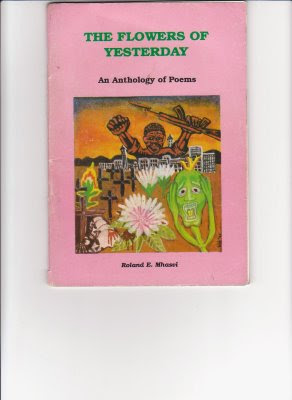Roland Mhasvi's Flowers
 This is the cover of my copy of Roland Masvi's Flowers of Yesterday, a collection I reviewed in 1996 for The Herald. I was going through my old stuff when I saw this book in my old collection.
This is the cover of my copy of Roland Masvi's Flowers of Yesterday, a collection I reviewed in 1996 for The Herald. I was going through my old stuff when I saw this book in my old collection. As I was flipping through the pages, I saw the cut-out for the original review, which in part reads:
"This is a collection of highly esoteric poetry..., which can be charged of what Afrocentric scholars have described as 'piles of esoterica and ostentatious erudition'... The language is to the ordinary reader opaque, the imagery is inaccessible and the symbolism is surprisingly unusual but invitingly novel...real food for scholars."
The review just reminds me of the Chinweizu days, when we, as university students, had rediscovered African literature and its theory. Talking about Afrocentricity had a certain appeal, and we were looking at a lot of writing through the lenses of this newly-discovered Afrocentricity. Looking back, perhaps there was more in Mhasvi's poetry that went beyond this charge of erudition and esoterica. Let's see:
The dry cracks of the mind fill up with sand,Dusty acres of self-doubt spread,Creeping jaggedly on, Leaving in their wake,like the ruins Of an ancient civilization,The broken fragments of a despairing vision...
This is the first stanza of a piece entitled "Dawn 1984", which ends with these lines:
Sorrows that come hurtling down mind wallsand Smash into the blood clots that echoIn the empty chambers of a lonely heart.
Perhaps the review could have focused more on the message of despair, the stench of sorrow, something as applicable to today's Zimbabwe more than it was in 1984 (the time the poem references) and 1996, when I wrote the review. And you haven't even seen this:
The darkening gloom spreads over the prostrate land,Over the barren wastes of a sickening mind... ...shadows and leewaysOf a forgotten dream.
I could easily have stopped there, could simply have talked about the recent ESAP that my own Shona poetry had begun to talk about, the people who were already "speeding" to Zambia and South Africa to "drag home" some rags (in the form of second-hand clothes clothes that most people back home could afford to buy). I remember back then a tsano of mine (you know, an in-law person) saying, "We laugh at Zambia now, but wait until they laugh at us. This country of ours, people will laugh at us one day!"
The dreams that Mhasvi is talking about were beginning to slip away, but there there were other dreams in the air that were waiting to be dreamed. Some of us were writing little stories and dreaming of fame; others were beginning to cross into the diaspora. But the dream was everywhere around us; I was in Chimanimani typing the Masvi review on a typewriter at my rural school, aware that on the very next day I would fax it to The Herald. The $15.00 or so I would receive for the review later was extra cash, for when I would be in Harare, taking Chido (not real name) to watch Waiting to Exhale.
Here was Masvi talking of a disappearing dream, but he knew too that there would be hope:
From the East a light glows,A beacon of the heart,An arc of radiance and power thatBy the minute grows,And lo! from the East tufted grass, ...the land begins to pulse and beat,Washed in the glowing promise of a new dawn.
In his poem, Masvi knew that his 1984 dawn was late, but it was there, coming from this East... (and I am here wondering:East? Mozambique? What? The Look-East-Policy Zimbabwe was to talk about in the midst of Western Sanctions?)
But that's the beauty of poetry, its ability to use images with infinite possibilities of interpretation.
The title poem is about change:
"The Old World of high mountains and low vales,
Of old plains that nestled towns and cities,
Rolled away and was dissolved into Myth,
And uncoverd levelled land that stretched far
To the deadly Flats of re-built Futures."
That early in1996, I was annoyed by what I viewed then as the "fake" capitalization of impotent words in the poems, like, "Old World", "Flats", "Futures". But I could not ignore the promise in these lines: "The Flowers of Yesterday had become/The Weeds of Tomorrow." And if Tomorrow is Today, and we are talking about the former heroes of Zimbabwe who have caused untold suffering, you can detect a prophetic message, right? And guess what happened to the flowers of yesterday:
"The Old Sun kissed your sinking hills farewell,
And, soon, you were but twinkles in the gloom."
I can't end this discussion without citing this last stanza of "Sunset", the last poem of the book:
"My sun is set; I lie in shade,
And shadows thicken round my cave!
Most like my soul will smoke in Hades As maggots swarm my silent grave."
Reading it now, I could easily say it's the voice of one of the Flowers of Yesterday, whose "sinking hills [and their caves] have been kissed Farewell by the "Old Sun"....
There was something for the ordinary reader in this book after all!
Comments